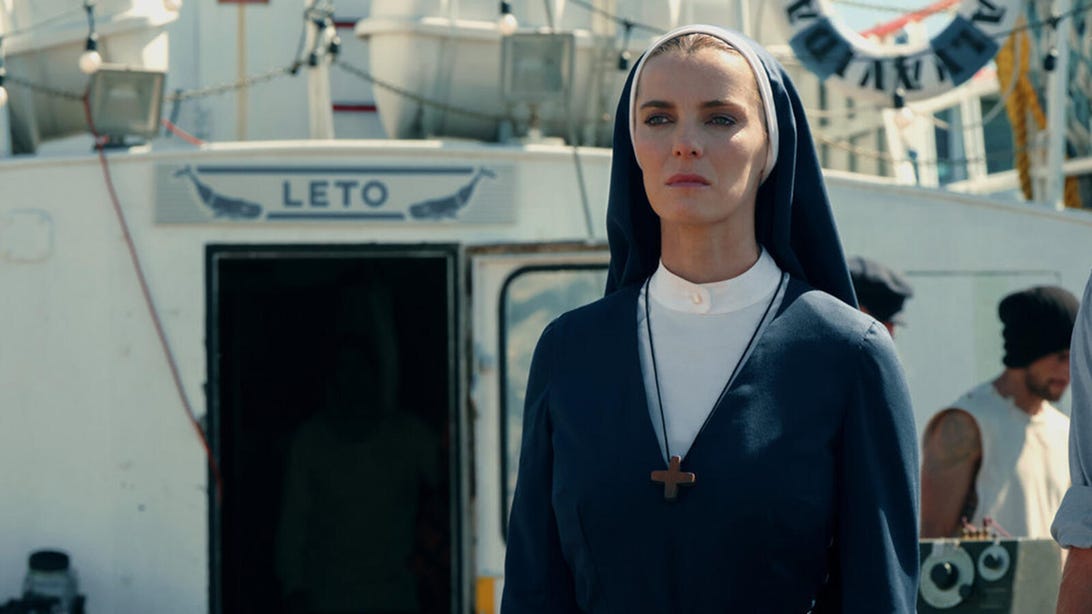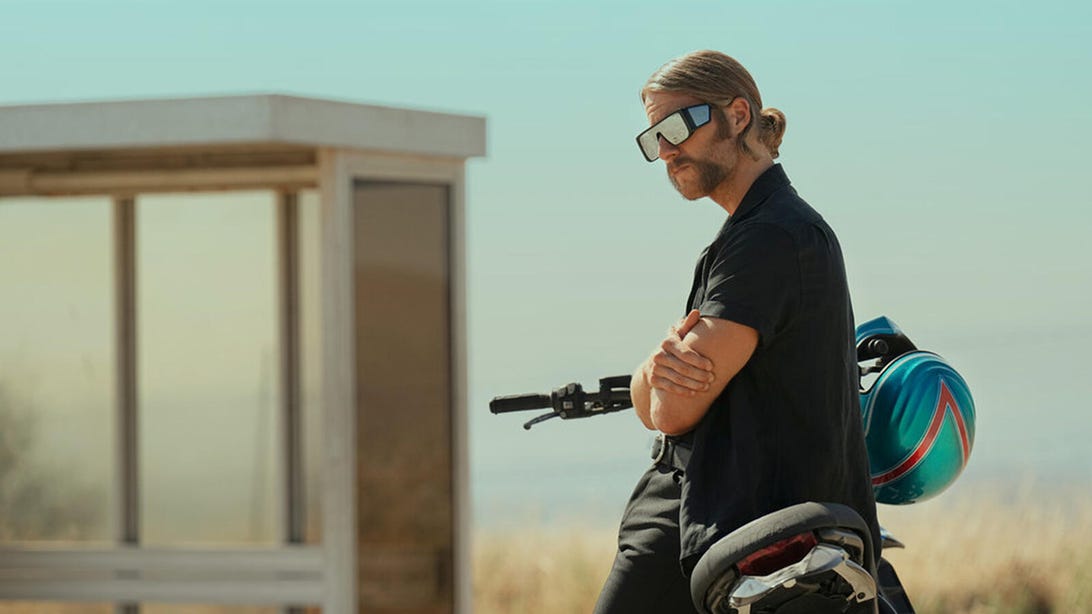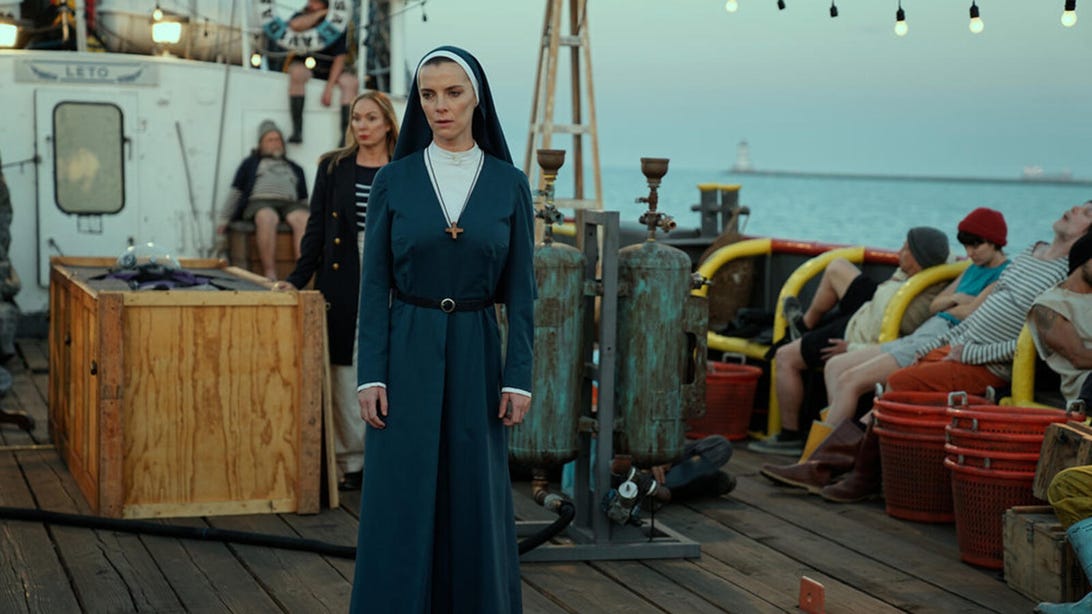Join or Sign In
Sign in to customize your TV listings
By joining TV Guide, you agree to our Terms of Use and acknowledge the data practices in our Privacy Policy.
Mrs. Davis Director Frederick E.O. Toye on the Moment He Knew the Show Would Be 'Awesome'
'I completely embraced how special Mrs. Davis would be'

Betty Gilpin, Mrs. Davis
Tina Thorpe/Peacock[Warning: The following contains spoilers for Episode 7 of Mrs. Davis, "Great Gatsby 2001: A Space Odyssey." Read at your own risk!]
Mrs. Davis went inside the belly of the whale this week, and the whale had nothing on Simone's (Betty Gilpin) mother-in-law.
The seventh episode of Tara Hernandez and Damon Lindelof's Peacock series wraps up a major part of Simone's quest — she's got the Grail! — but drops a mother of a surprise on her in the process. When the nun puts on the Lazarus Shroud and is swallowed by the whale, she's transported to Jay's (Andy McQueen) flooded restaurant, where she finally gets to meet the boss herself: Mary (Shohreh Aghdashloo).
Simone finds Mary in Jesus' tomb, located beneath the restaurant. Mary, standing above her son's shrouded body while holding him as an infant, explains that Jesus is both alive and dead here, trapped in a limbo she created when she fashioned the Grail out of her son's skull (!). The Grail gave her the ability to visit her son whenever she wanted, and others, Simone included, found their way to him, too. But Mary believes Jesus won't be at peace as long as he's tethered to the restaurant. Simone can free him by destroying the Grail, but if she does, she'll never be able to see him in person again.
And one more thing: Drinking from the Grail is a test of motive. If Simone drinks for selfish reasons — like, for instance, out of hatred for the algorithm — her head will explode. She can only destroy the Grail if she drinks out of love for Jay. As a test before the test, Mary dangles the holy object just out of Simone's reach, forcing her to unhook her oxygen supply in order to grab it. The leap of faith pays off when she washes ashore later with the Grail in her hands, but her celebration is cut short when she's surrounded by a swarm of beachgoing Mrs. Davis acolytes, who serenade her with an unsettling rendition of Eddy Grant's '80s hit "Electric Avenue."
It's a fittingly surreal end to the penultimate episode of Mrs. Davis' first season. Directed by Frederick E.O. Toye and written by Jason Ning and Jonny Sun, "Great Gatsby 2001: A Space Odyssey" is a pivotal hour, one that dishes out emotional revelations without losing the show's batty sense of humor. For Toye, a prolific TV director whose other credits include Watchmen and The Boys, that balance was important. "I'm looking for entertaining entertainment these days," Toye told TV Guide. "The end of the world and the apocalypse and 'we're all gonna die' stuff is a little tiresome for me right now after years and years of the apocalypse."
"I totally dug what Mrs. Davis was about," he said. "There are these incredibly beautiful, dramatic elements that draw on historical lore, and yet it's just fun to watch."
It was evidently fun to direct, too; Toye called one scene with Jake McDorman's Wiley and Chris Diamantopoulos' JQ "one of my favorite days of filming in my entire career." The director spoke to TV Guide about finding comedy in unexpected scenes, landing Simone's big meeting with Mary, and keeping Betty Gilpin conscious in the Lazarus Shroud.

Jake McDorman, Mrs. Davis
Elizabeth Morris/PeacockThis is the only episode that you directed this season, and the tone of this show is so particular, so I'm curious what it was like for you to jump into the world of Mrs. Davis.
Frederick E.O. Toye: I feel very fortunate because I had worked with Damon previously. I'd never worked with Tara, who I just adore and we've become really close, but I've worked with Damon before on Lost and Watchmen. When the opportunity came to me, I had a very small period of time that I was available, and it just so happened to be right when this was necessary. It was a really complex episode with a lot of production issues that needed to be dealt with. I'm like, "Oh, you guys want me for the suicide mission?" [Laughs] And I find suicide missions fun. Knowing Damon's tone and then spending time with Tara, I realized that the world was open to a tonal interpretation, and the show was such an amalgam of different concepts and ideas that I felt as though the more fun that I could have with it, the better. Rather than approaching it timidly, I felt I was welcome to the party to interpret in a bold way, which is what I tried to do.
I want to talk about the big scene between Simone and Mary in the restaurant, which is also Jesus's tomb, which is also kind of in the belly of the whale, at least from Simone's perspective. When you were finding the look and feel of that scene, how did you balance all of those different ideas about where it's even taking place?
Toye: What was interesting to me was that I felt as though that scene needed grounding, that in some ways we needed to stop time for the time that Simone actually goes down into the cave. Because that was where the story landed — where all the pieces came together and we were going to find the Grail, and we were going to discover what was going to drive Simone beyond that point. So for me, it was about finding a way to do honor to religious iconography, with the photography and the staging, but also to ground it emotionally.
I had wonderful collaborators with David Stockton, our Director of Photography, and of course with our actors, Betty and Shohreh. We really approached the scene work as if it wasn't taking place in a cave and it was just two humans with two differing points of view — and of course, the awe of Simone meeting her mother-in-law. Once we found where the scene was going to live in a very grounded, emotional way, then we built outwards from that when it came to the set and the lighting and how to present her in the most iconic way. But it was a very emotional experience.
I think Betty in particular was very moved by that scene, and moved by the experience, but she had this added problem, and that was that she was wearing the Lazarus Shroud. This was filmed on the soundstage, which meant that it was temperature controlled, but wearing this suit, she couldn't breathe. So we had to provide her oxygen inside the suit. And it was a really complicated suit to get on and for her to wear. She was in physical pain while she was experiencing it, and also dragging that tube behind her and carrying the suit with her, so it became a true experience for Betty. And I think it resulted in an incredibly profound performance from her.
I was going to ask about that Lazarus Shroud from a visual perspective, too. On the one hand, it is hiding part of Betty's face, but on the other hand, it has its own lighting, which looks so cool.
Toye: We did a lot of preparation and testing in order to get that, because the suit itself was handmade. It was in the last days or so before we began filming that we had figured out how we were going to light that suit. The bigger problem was how we were going to get it into the water — it was one thing to wear on a beach or in a cave on a soundstage, but it's a whole other thing to wear it on the deck of a ship and be lifted by a hoist and dropped into the water. There were two suits, and there was one suit intended to go into the water, but we were very fortunate everything worked out perfectly. We managed to get it into the water in one take, and then we pulled her out. That suit in particular — the moment on the ship when she says goodbye to her mother and she walks under that shower of green goo, I think I was probably about two weeks into filming at that point. As soon as that green goo hit that helmet and I saw the look on her face, it was like, "This show is gonna be awesome." That was actually the moment that I completely embraced how special Mrs. Davis would be, when I saw that valium hit the Lazarus Shroud.
It's interesting that it was such a physical burden for Betty, because earlier, when Simone is telling everyone on the ship what the plan is going to be, she looks like she's physically ill.
Toye: That performance on the deck of the ship is so authentic to Betty, because it was intended to brief the crew and her mother, so there's the absurdity of the plan being presented to Celeste. But the way that Betty played it, just totally on her own, was a deep insecurity about whether this plan would ever work. She doesn't even know how absurd it is until she actually says it out loud, and that's how she plays the scene. And then you have Ben Chaplin, who's wonderful, playing Schrodinger, standing behind her sticking his thumb up like, "Great plan." Fantastic performance. That scene is really funny.

Betty Gilpin, Mrs. Davis
Elizabeth Morris/PeacockTo go back to the cave, I want to talk more about how you light and frame Mary. She's backlit, and it looks very classic. I'm curious what you wanted the visuals to say about Mary.
Toye: What we wanted to do, which I think the show does very well, is evoke iconic imagery from paintings and sculptures from times past that are presenting Christianity in a certain sort of magical light. We looked at a lot of artwork. We looked at certain Dutch masters and a bunch of different Rembrandts, so we built that into the set design. There's a little hole in the cave just behind her that was going to be able to provide that light, and there was a lot of planning around how we were going to light her. We would go on to the soundstage and pre-plan all the blocking, how [Simone] was going to be able to just be short enough so she couldn't reach the Grail at the end, and all of that. And the lighting was planned based on that blocking. We did have to make modifications to the set a little bit so that we could provide that image, because we were looking for something very specific and iconic from classic Renaissance paintings.
In terms of her performance, did you talk to Shohreh about playing Mary as a holy figure versus as a mother-in-law?
Toye: We actually did talk about it quite a bit. She was wonderful, and she wanted to talk about how to play it. Just for safety reasons — and when I say safety, I mean in editing — I knew that we were going to modulate how Mary was going to be presented. She was happy to provide a range within that performance, in terms of how much she plays into the mother-in-law character and the humor of that, but also being able to carry the weight of the narrative in this performance. Because if it was played too comedically, or too light, it wouldn't have that grounding that was so important, but then on the other hand, if you played it too earnest, it could appear maudlin. It was the most important scene for me to present correctly. I fortunately had an amazing thoroughbred of a performance in her and Betty so that we were able to experiment a little bit when we were shooting, but I mostly found when we were in editing that her initial read on it was the one we ended up using. Her instinct was really good.
At the end of the episode when Simone washes up on the beach, it's this victorious moment, but then when the crowd surrounds her, it almost feels like this horror movie. What tone did you want to hit there?
Toye: It's terrifying. I wanted the beach scene to be voyeuristic, in a way. When you see her rolling around in the surf, you don't know that she's actually got the Grail, and so when you see her grab the Grail, my hope was that it would be this victorious moment, but it would feel as though you were kind of an observer. So we did it handheld and we did it in kind of a creepy way, knowing that when people started, like zombies, to get up and approach her, that you would feel that sense of Big Brother and oppression as all eyes are on her.
I spoke with Alethea Jones about last week's episode, and there's a moment in that one when Wiley starts chanting, "You're a big strong boy, everybody loves you, you're never gonna die." And then in this episode, we hear JQ listening to that phrase on a motivational tape.
Toye: That was great.
I was curious because Alethea said it wasn't scripted for Jake to say that last week.
Toye: Yeah, it's not scripted in this episode either.
So was that added later based on what Jake did in last week's episode?
Toye: I believe so. I can't speak for Tara, but I would assume that what happened was it was such a great gag for [Episode] 6 that they put it in there. With Wiley waiting on his motorcycle in front of the pyramid and JQ riding up in the truck, there was a little bit of a moment for music or something to fill that. I think in the temp we had used some hard rock song, or something like that. And it was a much better idea to put that motivational tape in.
Was there any comedy in this episode that came out of something unexpected?
Toye: The pyramid scene where they take their clothes off was already funny on the page. We were all excited about that scene. We just couldn't find a place to put it. At first it was going to be a big Walmart parking lot kind of thing, and then we put it out in a dry lake bed in the middle of nowhere, and that didn't work. It rained and ruined that set, so we couldn't do it there. So we ended up at that [final] location, which is a beautiful location called Mystery Mesa, and we put the pyramid there. But what was unexpected was that ridiculous golf cart and that kid [played by Scott Cooper Ryan]. That was so much funnier than I thought it was going to be. When Chris starts calling him a nerd, there was a lot of ad libbing of him being a nerd and that stupid f---ing car and all that. And [Ryan] just never broke character — like, he was playing it Method. The golf cart kid. We could not stop laughing every time that guy would roll up, and he just kept doing take after take after take in that stupid golf cart.
Chris and Jake together, that was a mind-blowing experience for me. When we did the scene where [Chris] is on top of the taco truck, with that ridiculous Australian accent that he dons, talking about how he loves these guys before he blows up the Hippocampus, that's one of my favorite days of filming in my entire career. He and all of those guys, the Durdens, brought this incredible energy to play the dudes and the bros. This totally absurd, over-the-top, testosterone-fueled rah rah. It was so much fun to see.
New episodes of Mrs. Davis premiere Thursdays on Peacock.
